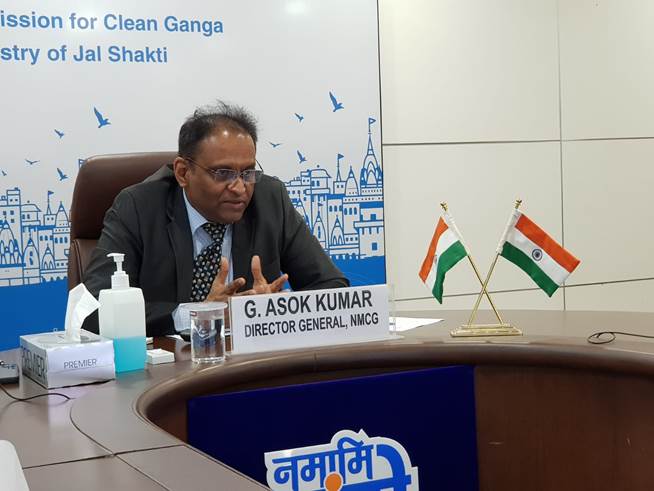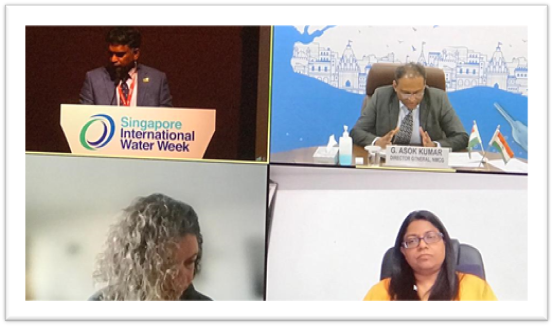
- Self-Study Guided Program o Notes o Tests o Videos o Action Plan

Director General, National Mission for Clean Ganga (NMCG) Shri G. Asok Kumar participated virtually in Singapore International Water Week, Water Convention 2022 and gave a presentation on ‘Status of Wastewater Generation, Treatment and Management in India: Success Through NMCG Initiatives.’ Shri Kumar spoke in the Hot Issue Workshop hosted by NMCG on 17th April on ‘Sustainable Wastewater Management in Developing Countries: An Innovative Indian Approach in River Rejuvenation’ under theme 3 of the Water Convention.

Outlining the water scenario in India and key government schemes in water and wastewater sector, Shri G. Asok Kumar termed the formation of Jal Shakti Ministry in 2019 “a historic moment” and apprised the audience with the success of ‘Catch the Rain: Where it Falls, When it Falls’ campaign under the Jal Shakti Abhiyan.
Shri Kumar gave an overview of the Namami Gange Programme and shed light on some of the positive outcomes and impact of the project. He spoke about Arth Ganga and informed the audience about its six verticals – Zero Budget Natural Farming, Livelihood Generation Opportunities, Cultural Heritage & Tourism, Monetisation and Reuse of Sludge & Wastewater, Public Participation and Institutional Building.
DG, NMCG said that the focus of the Phase-II of Namami Gange Programme will be on sewerage infrastructure creation in the tributaries of Ganga such as Yamuna and scaling up of PPP development efforts. He reiterated the commitment of NMCG to develop a circular economy model focused on reclaim, reuse and recycling. One of the key areas of work in the future, he added, will be feacal sludge and septage management in urban local bodies and rural areas.

Responding to a question on sludge management, Shri Kumar said: “Tonnes of sludge is generated every day and we aim to develop a circular economy based on sludge management,” adding, “Under Arth Ganga, which aims at connecting people with the river, we are trying to give some economic benefit to the stakeholders/people so that they have some interest in ensuring the river is clean.”
He added that as per the directions of the NGT, a campaign is being run to keep the river stretches across India clean and drive the States to assess the total generated sewerage and the existing capacity and use the various schemes of the government to reduce the gap ensuring not a single drop of wastewater goes into the river. “This will generate a lot of sludge – one of the verticals of Arth Ganga is ‘Zero Budget Natural Farming’ which aims at facilitating the natural farming process by providing natural manure/soil conditioner made out of sludge and reduce the use of chemicals and fertilizers by the farmers thereby developing a circular economy model in sludge management with economic benefits to the stakeholders (farmers in this case).”
Other speakers during the first part of the Workshop included Mr. D P Mathuria (ED-Technical, NMCG), Mr. Rajiv Ranjan Mishra (Chief Advisor, National Institute of Urban Affairs (NIUA) & Former DG,NMCG ), Mr. Bhairav Desai ( From Surat Municipal Corporation), Mr. K P Bakshi (Former Chairman, Maharashtra Water Resource Regulatory Authority), Mr. K P Maheshwari (CEO, Adani Water), Mr. Rajneesh Chopra (Global Head- Business Development, VA TECH WABAG LTD.) and Dr. Nupur Bahadur, (Senior Research Fellow, TERI - The Energy and Resources Institute). During this session, the presentations were made on topics such as effective and efficient wastewater management in India, efforts to mitigate governance challenges and ushering in a paradigm shift in the Indian wastewater sector; role of private sector and industry partners, co-creation of knowledge base, research and development ecosystem and people connect, case studies from Indian cities, in asset creation and maintenance through unique project delivery models, etc.
In the second part of the session, panelists from other developing as well as developed countries shared their experiences, challenges and best practices adopted in the domain. The panelists included Mr. Kala Vairavamoorthy (ED, International Water Association, Mr. Sumouleendra Ghosh (Associate Partner and Global Water Lead, KPMG India), Dr. Valerie Naidoo (Executive Manager, Business & Innovations, Water Research Commission, South Africa), Mr. Madhav Belbase (Former Secretary, Nepal Water Supply Ministry) and Prof Tony Wong (Chair, Water Sensitive Cities Think Tank, Monash University).
*******
BY/AS
Director General, National Mission for Clean Ganga (NMCG) Shri G. Asok Kumar participated virtually in Singapore International Water Week, Water Convention 2022 and gave a presentation on ‘Status of Wastewater Generation, Treatment and Management in India: Success Through NMCG Initiatives.’ Shri Kumar spoke in the Hot Issue Workshop hosted by NMCG on 17th April on ‘Sustainable Wastewater Management in Developing Countries: An Innovative Indian Approach in River Rejuvenation’ under theme 3 of the Water Convention.

Outlining the water scenario in India and key government schemes in water and wastewater sector, Shri G. Asok Kumar termed the formation of Jal Shakti Ministry in 2019 “a historic moment” and apprised the audience with the success of ‘Catch the Rain: Where it Falls, When it Falls’ campaign under the Jal Shakti Abhiyan.
Shri Kumar gave an overview of the Namami Gange Programme and shed light on some of the positive outcomes and impact of the project. He spoke about Arth Ganga and informed the audience about its six verticals – Zero Budget Natural Farming, Livelihood Generation Opportunities, Cultural Heritage & Tourism, Monetisation and Reuse of Sludge & Wastewater, Public Participation and Institutional Building.
DG, NMCG said that the focus of the Phase-II of Namami Gange Programme will be on sewerage infrastructure creation in the tributaries of Ganga such as Yamuna and scaling up of PPP development efforts. He reiterated the commitment of NMCG to develop a circular economy model focused on reclaim, reuse and recycling. One of the key areas of work in the future, he added, will be feacal sludge and septage management in urban local bodies and rural areas.

Responding to a question on sludge management, Shri Kumar said: “Tonnes of sludge is generated every day and we aim to develop a circular economy based on sludge management,” adding, “Under Arth Ganga, which aims at connecting people with the river, we are trying to give some economic benefit to the stakeholders/people so that they have some interest in ensuring the river is clean.”
He added that as per the directions of the NGT, a campaign is being run to keep the river stretches across India clean and drive the States to assess the total generated sewerage and the existing capacity and use the various schemes of the government to reduce the gap ensuring not a single drop of wastewater goes into the river. “This will generate a lot of sludge – one of the verticals of Arth Ganga is ‘Zero Budget Natural Farming’ which aims at facilitating the natural farming process by providing natural manure/soil conditioner made out of sludge and reduce the use of chemicals and fertilizers by the farmers thereby developing a circular economy model in sludge management with economic benefits to the stakeholders (farmers in this case).”
Other speakers during the first part of the Workshop included Mr. D P Mathuria (ED-Technical, NMCG), Mr. Rajiv Ranjan Mishra (Chief Advisor, National Institute of Urban Affairs (NIUA) & Former DG,NMCG ), Mr. Bhairav Desai ( From Surat Municipal Corporation), Mr. K P Bakshi (Former Chairman, Maharashtra Water Resource Regulatory Authority), Mr. K P Maheshwari (CEO, Adani Water), Mr. Rajneesh Chopra (Global Head- Business Development, VA TECH WABAG LTD.) and Dr. Nupur Bahadur, (Senior Research Fellow, TERI - The Energy and Resources Institute). During this session, the presentations were made on topics such as effective and efficient wastewater management in India, efforts to mitigate governance challenges and ushering in a paradigm shift in the Indian wastewater sector; role of private sector and industry partners, co-creation of knowledge base, research and development ecosystem and people connect, case studies from Indian cities, in asset creation and maintenance through unique project delivery models, etc.
In the second part of the session, panelists from other developing as well as developed countries shared their experiences, challenges and best practices adopted in the domain. The panelists included Mr. Kala Vairavamoorthy (ED, International Water Association, Mr. Sumouleendra Ghosh (Associate Partner and Global Water Lead, KPMG India), Dr. Valerie Naidoo (Executive Manager, Business & Innovations, Water Research Commission, South Africa), Mr. Madhav Belbase (Former Secretary, Nepal Water Supply Ministry) and Prof Tony Wong (Chair, Water Sensitive Cities Think Tank, Monash University).
*******
BY/AS